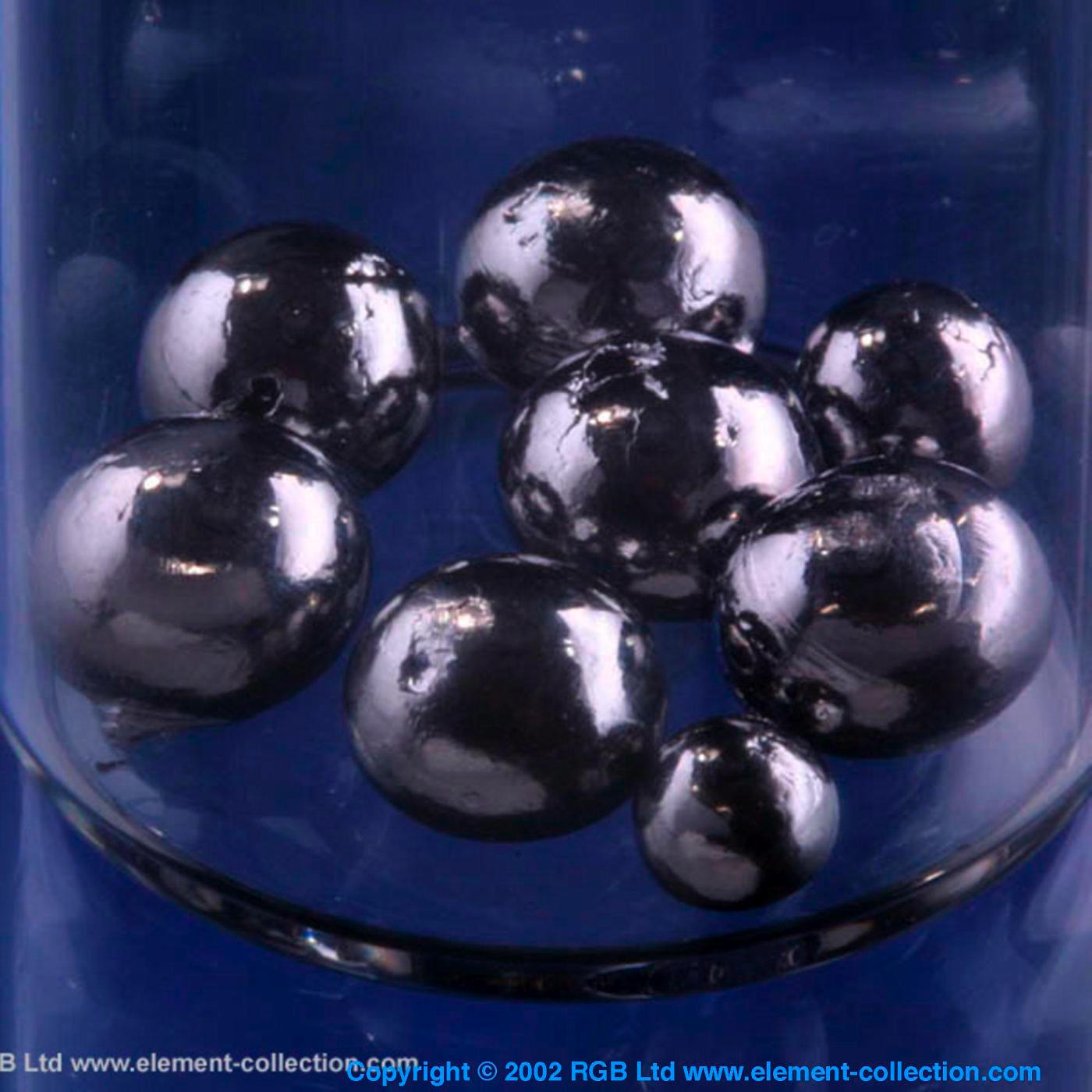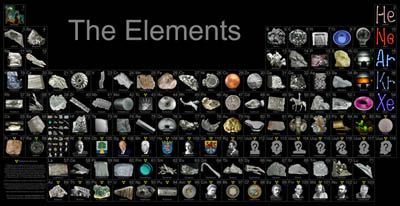|
|
|
|
|
|
|
|
|
|
|
|
|
|
|
|
|
Rhenium is a member of the noble metals sub-group, but unlike the other members it doesn't seem to be used in jewelry, though it probably could be. Others in the group are cheaper, prettier, or just more fashionable.
|
|
| |
|
|
|
|
|
Rhenium in Wolframite.
This is basically a fine powder which is said to have been determined by neutron activation analysis to be microscopic inclusions of rhenium in wolframite grains. No reason to doubt the claim. But it is a good bit of money to pay for a powder that, honestly, looks a lot like just about any other powder.
It is described as coming from eastern Transbaikal, Russia (interestingly the tag it came with is marked "E. Transbaikal, U.S.S.R.", indicating that the sample must have been collected some time ago).
Source: Topaz Mineral Explorations
Contributor: Theodore Gray
Acquired: 20 July, 2002
Price: $36
Size: 0.001"
Purity: >50%
Sample Group: Powders
|
|
|
|
|
|
|
  Old photographic flash bulb. Old photographic flash bulb.
Back in the dark ages, cameras used one-time-only flash bulbs that ignited a fine wire inside a glass bulb. We're not concerned here with the fine wire, but rather with the "igniter": these top-quality GE #5 bulbs were advertised as coming with "the guaranteed RHENIUM igniter". I don't know for sure what metal the wire in this one is made of, but I have a different type under zirconium which is labeled as using a wire of that metal (but that one doesn't say what it's igniter is made of).
Reports Tryggvi:
The woolly stuff in GE flashbulbs is zirconium. (I.e. , the stuff that burns and makes the light. The bulbs are also filled with a few atmospheres of oxygen). The flashbulbs in the cubes that were used on some Kodak Instamatics were not triggered electrically (with rhenium wire), but with a percussive pyrotechnic mix inside a little metallic tube that stuck out of the bulb.
Source: eBay seller erinsplace
Contributor: Theodore Gray
Acquired: 1 August, 2002
Text Updated: 29 January, 2009
Price: $1
Size: 1.5"
Purity: >50%
|
|
|
|
|
|
|
1cm wire.
A very small sample indeed, but since it's from David Franco, it is of course of the highest purity.
Source: David Franco
Contributor: Ed Pegg Jr
Acquired: 16 August, 2002
Price: $6
Size: 0.4"
Purity: 99.98%
|
|
|
|
|
|
|
 Sample from the RGB Set. Sample from the RGB Set.
The Red Green and Blue company in England sells a very nice element collection in several versions. Max Whitby, the director of the company, very kindly donated a complete set to the periodic table table.
To learn more about the set you can visit my page about element collecting for a general description or the company's website which includes many photographs and pricing details. I have two photographs of each sample from the set: One taken by me and one from the company. You can see photographs of all the samples displayed in a periodic table format: my pictures or their pictures. Or you can see both side-by-side with bigger pictures in numerical order.
The picture on the left was taken by me. Here is the company's version (there is some variation between sets, so the pictures sometimes show different variations of the samples):

Source: Max Whitby of RGB
Contributor: Max Whitby of RGB
Acquired: 25 January, 2003
Text Updated: 11 August, 2007
Price: Donated
Size: 0.2"
Purity: 99.95%
|
|
|
|
|
|
|
Sample from the Everest Set.
Up until the early 1990's a company in Russia sold a periodic table collection with element samples. At some point their American distributor sold off the remaining stock to a man who is now selling them on eBay. The samples (except gases) weigh about 0.25 grams each, and the whole set comes in a very nice wooden box with a printed periodic table in the lid.
To learn more about the set you can visit my page about element collecting for a general description and information about how to buy one, or you can see photographs of all the samples from the set displayed on my website in a periodic table layout or with bigger pictures in numerical order.
Source: Rob Accurso
Contributor: Rob Accurso
Acquired: 7 February, 2003
Text Updated: 29 January, 2009
Price: Donated
Size: 0.2"
Purity: >99%
|
|
|
|
|
|
|
 Before and after arc-melting. Before and after arc-melting.
This shows what happens when you blast some compressed rhenium powder (left) with a high-current electric arc in an arc melting furnace (under an inert argon atmosphere): You get a nice shiny button of solid rhenium (right). Max Whitby made this button while visiting an arc melting furnace at Leeds university: It worked so well now he's working on building one himself, using a welder as the power source.
He'll use it to make solids out of powders for a number of elements that are much cheaper in powder form, for use as samples in his commercial element set.
Source: Max Whitby of RGB
Contributor: Max Whitby of RGB
Acquired: 12 May, 2003
Text Updated: 11 August, 2007
Price: Donated
Size: 0.2"
Purity: 99.9%
|
|
|
|
|
|
|
  Rhenium foil. Rhenium foil.
These are tiny little strips of rhenium foil about half an inch long. If they were made of aluminum this would be a pile of fluffy shreds. But it's rhenium, one of the hardest and densest elements, so instead it's a surprisingly heavy mass of fairly stiff strips.
Source: eBay seller forsythia
Contributor: Theodore Gray
Acquired: 29 September, 2003
Price: $16
Size: 0.5"
Purity: 99.9%
|
|
|
|
|
|
|
  Museum-grade sample. Museum-grade sample.
In early 2004 Max Whitby and I started selling individual element samples identical or similar to the samples we use in the museum displays we build. These are top-quality samples presented in attractive forms appropriate to the particular element. They are for sale from Max's website and also on eBay where you will find an ever-changing selection of samples (click the link to see the current listings).
This bottle contains about 50 grams of arc-melted buttons made in Max's reduced-pressure argon-arc furnace.
Source: Theodore Gray
Contributor: Theodore Gray
Acquired: 24 February, 2004
Text Updated: 11 August, 2007
Price: See Listing
Size: 2"
Purity: >99%
Sample Group: RGB Samples
|
|
|
|
|
|
|
 Sintered button. Sintered button.
This is a compressed and sintered button of rhenium powder. It could be melted down into a solid button in an arc or e-beam furnace (see above), but it's interesting to keep a few of these around in pre-melted condition for comparison. I got this one from Oliver Sacks on a visit to New York, during which we visited a company in New Jersey to melt his kilogram of iridium down into a solid slab.
Source: Oliver Sacks
Contributor: Oliver Sacks
Acquired: 4 August, 2004
Price: Donated
Size: 0.75"
Purity: 99.9%
|
|
|
|
|
|
|
  Machined bar. Machined bar.
This absolutely stunning precision-machined bar of solid rhenium is worth a pretty serious amount of money, though Max got a great deal on it on eBay. Its density is around 20.5g/cc, slightly less than the theoretical density of 21.0g/cc. It's common for large bars of very high melting point metals like this to be lower in density than they should be, because they are formed by sintering a fine powder of the metal under high pressure (casting such a large piece being virtually impossible). The sintering process leaves microscopic voids, which must be compressed out by hammering, swaging, and the like in an attempt to beat the metal to the highest possible density.
I chose this sample to represent its element in my Photographic Periodic Table Poster. The sample photograph includes text exactly as it appears in the poster, which you are encouraged to buy a copy of.

Source: Max Whitby of RGB
Contributor: Theodore Gray
Acquired: 24 February, 2004
Text Updated: 4 May, 2007
Price: $700
Size: 4"
Purity: >99%
|
|
|
|
|
|
|
  Tungsten-rhenium alloy x-ray tube. Tungsten-rhenium alloy x-ray tube.
The conical disk in this sample is a heavy slab of tungsten-rhenium alloy. The structure above holds a filament that releases electrons, which are accelerated with a high voltage to strike the tungsten-rhenium disk, generating x-rays when they strike.
In operation the disk is spinning, because if it ever stopped the heat generated by the electrons slamming into the metal would start melting it. The small scratch towards the right is the explanation for why I have this tube: It's where the disk stopped and got burned.
Normally this whole setup would be inside a glass vacuum tube, but it broke in shipment, saving me the trouble.
Source: eBay seller kentuckyspecialfx
Contributor: Theodore Gray
Acquired: 15 April, 2009
Text Updated: 15 April, 2009
Price: $90
Size: 4"
Purity: 5%
|
|
|
|
|
|
|
  Big bag of beads. (External Sample) Big bag of beads. (External Sample)
This is a large ($18,000) order of platinum group metals placed by an excellent customer of my partner Max Whitby's element sales business. I happened to be visiting Max in London just before the order needed to be shipped to our customer in the US, so I hand-carried the precious cargo home rather than risking international shipping. These beads were made by Max in his reduced pressure argon arc furnace.
The customer wishes to remain anonymous, so you'll just have to keep wondering where this remarkable trove of rare metals currently resides: The only thing you can be sure of is that I don't have it.
Source: Max Whitby of RGB
Contributor: Max Whitby of RGB
Acquired: 4 September, 2007
Text Updated: 7 September, 2007
Price: N/A
Size: 0.25"
Composition: ReRuOsIr
|
|
|
|
|
|
|
|
|
|
|
|
|
  Rheniite. Rheniite.
Description from the source:
Rheniite (Re S2 tric.), Vulkan Kudriavy, Iturup, Kurilen, Russia. Dark very lustrous, metallic crust-microcrystals on lava. Extremely rare. 2x1,5x1,5 cm; 3 g.
Source: Simone Citon
Contributor: John Gray
Acquired: 28 January, 2009
Text Updated: 29 January, 2009
Price: Trade
Size: 0.75"
Composition: ReS2
|
|
|
|
|
|
|
|
|
|
  Big bag of beads. (External Sample) Big bag of beads. (External Sample)
This is part of a large ($18,000) order of platinum group metals placed by an excellent customer of my partner Max Whitby's element sales business. I happened to be visiting Max in London just before the order needed to be shipped to our customer in the US, so I hand-carried the precious cargo home rather than risking international shipping. These beads are made by Max in his reduced pressure argon arc furnace.
The order consisted of equal volumes of ruthenium, rhenium, osmium, and iridium. Here is what the whole collection looks like:

The customer wishes to remain anonymous, so you'll just have to keep wondering where this remarkable trove of rare metals currently resides: The only thing you can be sure of is that I don't have it.
Location: Anonymous
Photographed: 4 September, 2007
Text Updated: 6 September, 2007
Size: 0.25"
Purity: 99.99%
|
|
|
|
|
|
|
|
|
|
|
|
|
|
|